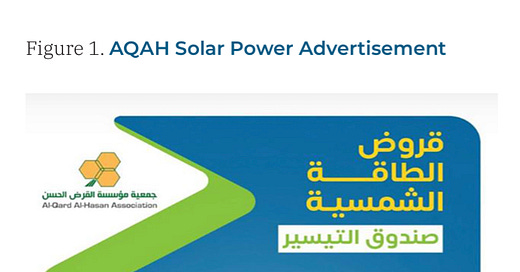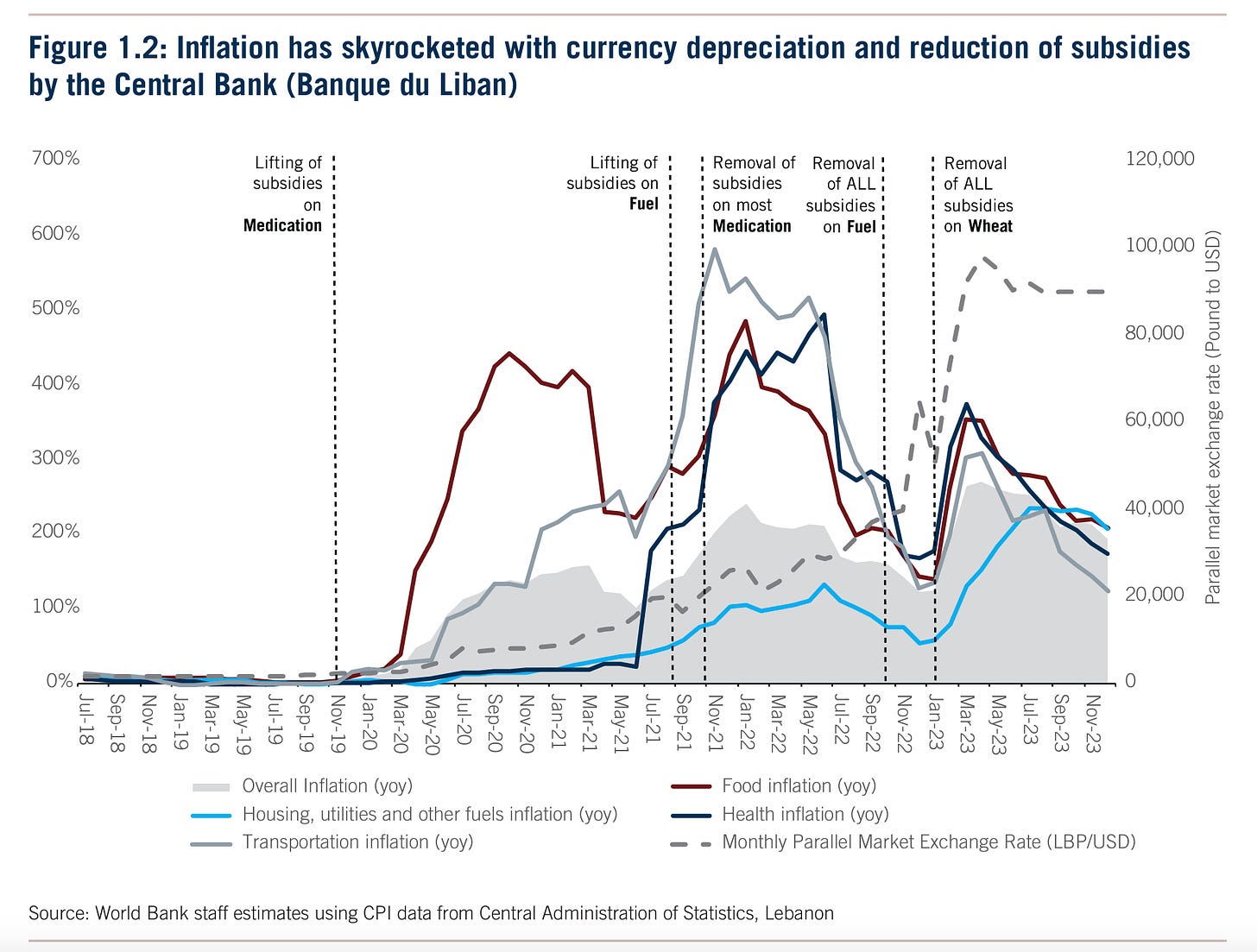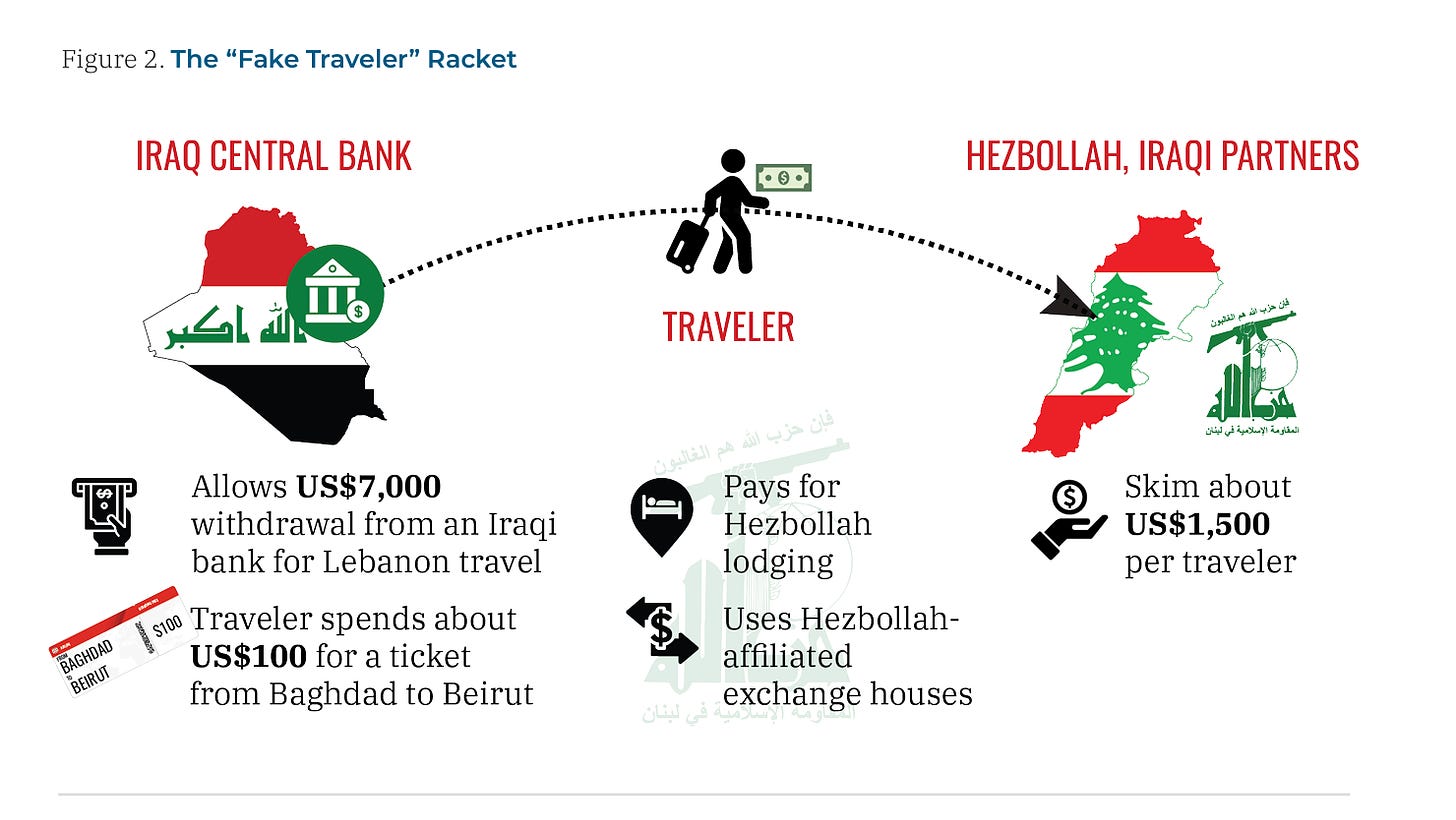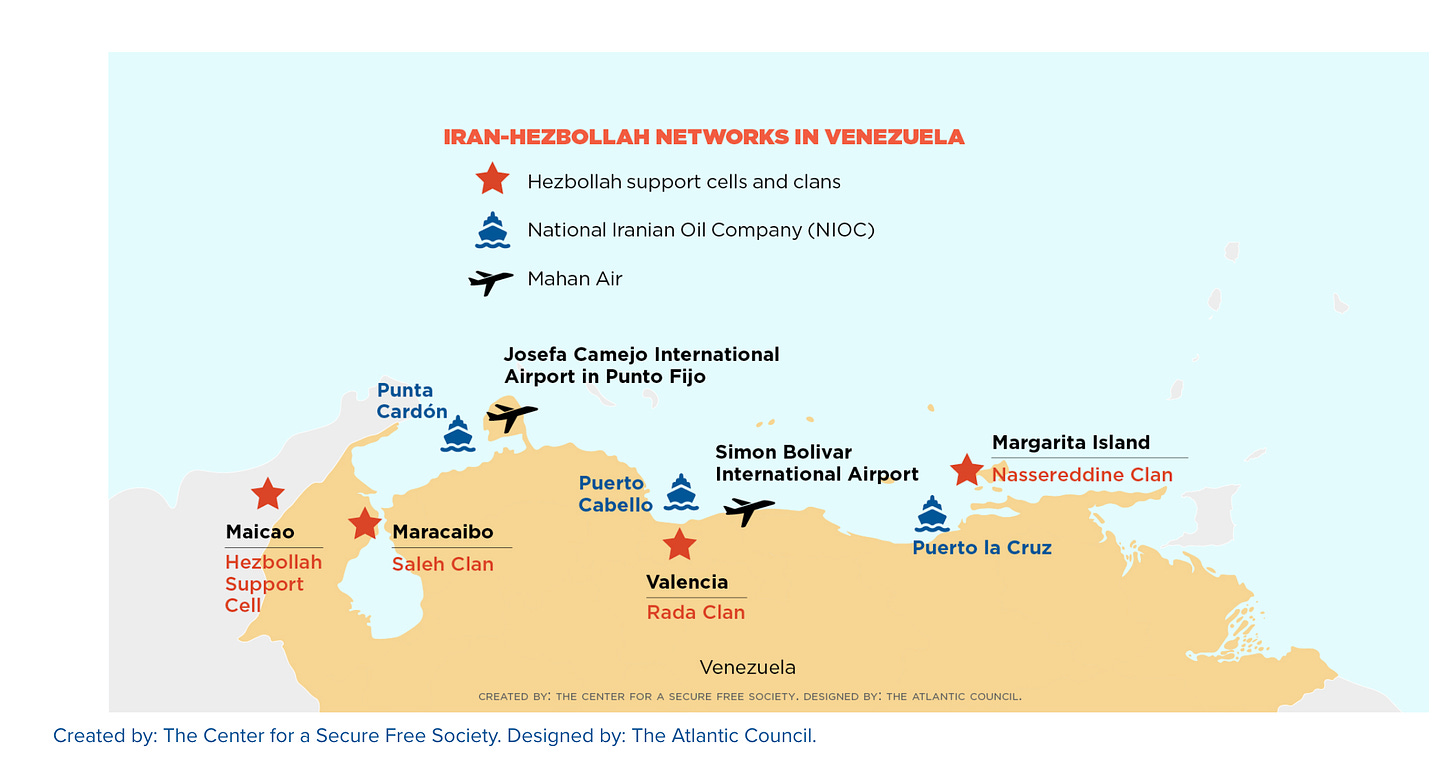As the world weighs the horrifying scenario of a “big war” in the Middle East and the likely impact on the world economy, starting with the oil price, spare a thought for the people in the eye of the storm. Think particularly of the millions in Lebanon who face the risk not only of Israeli bombardment, but of total economic collapse. Whatever the world price of oil, they will struggle to afford any.
The latest symptom of escalating economic stress to catch my eye was the report that Algeria is scrambling emergency deliveries of fuel oil to Lebanon to prevent a total collapse of the country’s electricity supply. As Bloomberg reports:
Electricite Du Liban said that the last remaining production unit of the Zahrani power plant has been “forcibly shut down” and that the blackout will affect the country’s airport, ports, water pumps, sewage systems and prisons, state-run National News Agency
This leaves better-off Lebanese relying on generators. Those need fuel that can normally only be procured for hard currency. For most Lebanese that is in desperately short supply. Even if the Algerian oil makes it to Lebanon, it is far from clear how the locals will pay for it.
To reduce a once-prosperous country like Lebanon to these dire straits takes more than a single shock. It takes more than a single catastrophe, even if it has the epic force of the Beirut blast of 2020. It takes more than a war, even one as costly as that with Israel in 2006. It is the result of multiple converging forces that go back to the civil war of the 1970s and 1980s and the sectarian power-sharing deal that followed, forces that paralyzed reconstruction after 2006 and gave Hezbollah a decisive role in parliament in 2018. Lebanon’s problems were compounded by the fiasco of Western policy in Iraq and after 2011 by the disastrous civil war in Syria, which drove millions to seek refuge in Lebanon. As dysfunction multiplied, water supplies failed, garbage went uncollected, wildfires raged without government response and bankruptcy approached, in the autumn of 2019 Lebanon entered a phase of open crisis. Street protests and impending default triggered capital flight and an accelerating collapse in the currency. Meanwhile, the government decision to slash subsidies and raise taxes hiked the cost of living. As the World Bank describes the spiraling disaster:
The sharp deterioration of the Lebanese pound, which lost 98 percent of its pre-crisis value by December 2023, propelled inflation to new heights. With imports constituting about 60 percent of the consumption basket (World Bank, 2022), the plunging currency led to triple-digit inflation which rose steeply from an annual average of 3 percent between 2011 and 2018, to 85 percent in 2019, 155 percent in 2020, and 221 percent in 2023. Inflationary pressures were exacerbated by the rise in global food prices since the war in Ukraine and Lebanon’s heavy reliance on wheat imports, along with the destruction of its strategic wheat reserves in the August 2020, Beirut port explosion. … inflation was consequently even more dramatic, skyrocketing from 4 percent in 2019 to 254 percent in 2020 and has remained in triple-digits through 2023. Faced with falling foreign exchange reserves, the government withdrew subsidies on medication, fuel, and wheat further fueling rising costs of healthcare and transport (Figure 1.2).
Back in 2021 I described this conjuncture as the West Asian polycrisis.
Under the impact of these shocks, the Lebanese economy began not only to inflate but to fall apart. There were desperate shortages of basics including water, power and the closure of the banking system. In a surreal twist Lebanese resorted to armed robbery to liberate their own money from elite-controlled banks.
In the spring of 2020 Lebanon failed to make payments on $32 billion of international bonds. The Lebanese political class did not have the will to enter into serious negotiations with its creditors, resulting in a “hard default”. As the crisis escalated, it was revealed that without government approval the financial elite had used the accounts of the central bank to support Lebanon’s private banks, to the tune of tens of billions of dollars.
As the currency plunged, prices soared and the banking system shut down, normal economic activity collapsed. In purchasing power parity terms, the World Bank estimates that GDP per capita has fallen by 45 percent.
This is one of the most dramatic implosions ever suffered by a modern economy. In July 2022, the World Bank downgraded Lebanon’s status from upper-middle income country, a position it had held for almost 25 years, to lower middle income country
At the bottom of the income pyramid, poverty has surged. As the World Bank describes it:
Monetary poverty in Lebanon has more than tripled from over a decade ago. New survey data2 covering the population residing in five governorates of Akkar, Beirut, Bekaa, North Lebanon and most of Mount Lebanon reveal a rise in consumption-based poverty in the covered areas from 12 percent in 2012 to 44 percent in 2022.3 Among the Lebanese residing in these five governorates, one out of every three individuals was poverty-stricken in 2022, up from 11 percent in 2012.4 Not only has the share of poor Lebanese increased, but they are also falling deeper into poverty. The depth of their poverty or poverty gap—which is the minimum financial amount required to bring the spending levels of the poor up to the poverty line, expressed as a share of the latter—rose from 3 percent in 2012 to 9.4 percent in 2022. A new, unofficial poverty line was developed for 2022 to better reflect the consumption behavior of households amidst the ongoing economic crisis. The existing national poverty line is outdated as it relies on consumption patterns from 2012 that no longer reflect the realities and conditions faced by households in Lebanon today. Overall prices have increased by nearly 15 times over the past decade, eroding the purchasing power of lira-denominated incomes. Survey data also reflects this change in consumption patterns – Lebanese households in 2022 residing in the covered governorates are consuming a third of the amount of (mostly imported) meat and seafood from a decade ago while the consumption of more affordable bread and cereals has risen by over 20 percent.
Rapid inflation acted effectively as a highly regressive tax, striking hardest at the poor and those with fixed, lira-denominated incomes. Lebanon has increasingly become a cash-based dollarized economy, which works to the benefit of those getting paid in a foreign currency. The size of the dollar-denominated cash economy is estimated to have increased from 26 percent in 2021 to around 46 percent of GDP in 2022 (World Bank, 2023a). Dollarization of the economy can be an impediment to economic growth as it raises the risk of money laundering, informality, and tax evasion (World Bank, 2024a). However, individuals who earn partially or fully in dollars are insulated from the loss of purchasing power induced by the sharply depreciating currency.
Apart from position in the income distribution, the fate of Lebanese is decided by where they live in the country. Beirut is relatively well protected compared to the Northern provinces where poverty is rife. In much of the territory no data can be collected. But what is clear is that the direst emergency is that facing the millions of Syrians who fled to Lebanon to escape the civil war. Amongst the refugee population, poverty rates stand at over 80 percent.
Earlier this year, the EU mobilized a new support package offering support to the tune of $1.06bn, but that money is directed, as the EU openly insists, towards the support of refugees notably from Syria. What is on Europe’s mind is the possibility of another migrant crisis, not the welfare of the Lebanese themselves. Unsurprisingly, resentment towards the refugees has become an easy topic for Lebanon’s failed political class to exploit. In a cynical act of scapegoating the Lebanese state has begun forcibly deporting thousands of Syrians.
Meanwhile, the Lebanese parliament in a grotesque act of self-dealing in January 2024 passed a budget that promised to close the budget deficit of 12.8 of GDP by raising regressive value-added tax whilst decreasing the progressive taxes levied on capital gains, real estate and investments. For lack of reforms, the IMF is refusing to disburse any of the $3bn package that are allocated to Lebanon.
The strategy of Lebanon’s relatively well-insulated elite seems to be to wait out the crisis hoping that in due course foreign donors will recognize that they have to provide support even in the absence of reform. Meanwhile, the on-going crises leave Lebanese with no option but to rely on the social and political forces that over the last decades have created the disastrous status quo. The most powerful of these is Israel’s antagonist Hezbollah.
Hezbollah is famous for entrenching its power in an elaborate social infrastructure of Islamic welfare. The social grip of those structures and services is increased by the ongoing crisis of the Lebanese economy. When the medical service fails, desperate families turn to the Hezbollah-run health service.
Subsidies from Iran help to sustain the Hezbollah operation in Lebanon. They are reckoned to amount to hundreds of millions of dollars per annum, far larger than anything Iran has ever provided to Hamas.
But Hezbollah is not merely an Iranian influence operation. It is deeply embedded in what is left of the Lebanese economy.
The escalating crisis in Lebanon since 2019 has stirred political opposition against Hezbollah. But it has also made Hezbollah’s infrastructure even more important for everyday life.
To give one critical example, the failure of central electricity supply makes local government and privately operated generators into key suppliers. As Samara Azzi and Hanin Ghaddar report electrical supply becomes political in the most direct sense:
the two Shia parties own the generator networks in Beirut’s southern suburbs and the country’s south. It does not cover the Baalbek-Hermel area, but local observers confirm the same trend there.52 Generator networks are run in one of three ways in Hezbollah-controlled areas: (1) They are owned and operated by the municipalities—which are typically controlled by Hezbollah (or Amal) members.53 (2) The party works through an individual to run the network as a private enterprise, even as the investment and profits consist mostly of Hezbollah cash. Or (3) they operate through a “private-public partnership” involving the municipality and private actors. Whichever the arrangement, the infrastructure and funding come from the “Party of God” and ultimately benefit Hezbollah operations. Unsurprisingly, the individuals and their companies are usually fronts for Hezbollah, or parts of its business network.54
Since the collapse of the Lebanese financial system in 2020, the Hezbollah-controlled financial firm known as al-Qard al-Hasan Association, or AQAH has expanded from paying Hezbollah’s army and officials to supplying liquidity to the wider Lebanese economy.
As one recent report described its operations:
In 2021, several of AQAH’s branches began installing ATMs that dispense large sums of Lebanese pounds and U.S. dollars to borrowers. Borrowers can withdraw as many dollars as they want and renew loans indefinitely, so long as they provide the collateral of gold, whose value is currently at an all-time high. Although there have been reports of gold confiscations in response to defaults, these cases are limited due to the negative impact this would have on Hezbollah’s public image. Instead, Hezbollah tends to hold onto the depositor’s gold while offering the option of renewing loans against it indefinitely upon repayment.
Want to set up a small business? AQAH will make you a loan. Want to answer the power crisis by installing cheap Chinese solar panels? Hezbollah controls the imports and it will be happy to provide you with financing.
Under US sanctions since 2007, Hezbollah’s shadow bank operates at arms length from the officially licensed and regulated banking system. It relies on a network of front operations and helpful connections in friendly Arab states. It may be cumbersome and rudimentary in its techniques. But, all told, it boasts of providing billions of dollars in loans to Lebanon’s families and small businesses.
Many of the loans are secured against gold, meaning that Hezbollah has become an aggregator of savings and assets, on the basis of which it can make rotating loans. To get its hands on dollars, Hezbollah, with the consent of local financial interests, operates a network of exchange shops. As Azzi and Ghaddar explain, Hezbollah exists not in isolation but in mutually beneficial cooperation with Christian business interests in Lebanon:
In the Lebanese cash economy, Hezbollah’s Christian allies control the foreign remittance services and the hard currency coming from abroad, while Hezbollah and Amal actors run the foreign exchange houses, and the internal transfer market— which deals mainly with payment to government ministries—is controlled by former Zgharta mayor Mouawad. This three-way setup ensures the financial health of the Hezbollah-Amal-Bassil axis—which in turn relies on BDL, the facilitator of a highly corrupt process, and the Ministry of Finance, the collector of payments and the distributor of contracts to internal transfer companies.
Hezbollah has friends not just in Teheran but in Baghdad too. Iraq’s foreign exchange regulations allow tourist travel schemes to be exploited to shuffle dollars into Lebanon.
A further source of revenue comes from Hezbollah’s connections to the Captogen drug-running schemes that have become a key pillar of the Iran-backed Assad regime in Syria.
Even further afield, investigations by the US authorities have exposed a set of connections between Hezbollah and the Syrian and Lebanese diaspora in South America and particularly in Venezuela. Most recently these networks appear to have been trading Iranian oil for Venezuelan gold, which is hoarded by the financial authorities in Teheran. As a result in 2000 Washington labeled Hezbollah not only as a terrorist organization, but as a transnational criminal organization along with MS-13 and the major Mexican cartels.
I’m in no position to judge the plausibility of these, at times, surreal seeming claims. Are there really Hezbollah-aligned clans dotting the Atlantic coastline of Venezuela?
The Atlantic Council thinks so, and what that means for Lebanon is that there is not just a war with Israel to worry about, but the Damocles sword of the Paris-based Financial Action Task Force (FATF. As Politico’s Matthew Karnitschnig reports the global financial watchdog may be on the brink of grey-listing Lebanon:
In the coming weeks it (FATF) is expected to place Lebanon on its “gray list” of wayward jurisdictions and determine what reforms the country would have to implement in order to receive a good bill of health and avoid FATF’s dreaded “blacklist.” Though FATF — which was set up by the G7 in 1989 and has since grown to include dozens of members from around the world — has no formal enforcement powers, its evaluations can have a chilling effect on a nation’s ability to operate in the world of international finance. … Officials familiar with FATF’s investigation, who spoke to POLITICO on the condition they not be named, said Lebanon would normally be an open and shut case, given how egregious the evidence of money laundering and terror financing in the country is. … Yet the broader dynamic in both Lebanon and the Middle East has complicated things. To begin with, Hezbollah’s influence over Lebanon’s core institutions means its central government is unable to enforce even the most basic international money laundering norms. An even bigger problem, the western diplomats said, is that several countries in the region, including Bahrain and Libya, have locked arms with Lebanon in opposing international regulators’ push for a crackdown, making it all but impossible to effectively target Hezbollah’s illicit financing.
Whether the current escalation of tension results in full-scale warfare, one thing is for sure: the imbrication of politics and everyday life goes far too deep to be extirpated through bombing, shelling or assassination.
I love writing Chartbook. I am delighted that it goes out for free to tens of thousands of readers around the world. What supports this activity are the generous donations of active subscribers. Click the button below to see the standard subscription rates.













I don't think Lebanon is more corrupt than other countries.
The problem with Lebanon is that for Israel to feel secure, everything around needs either be crashed (all republics) or made totally subservient (all kingdoms). The words sanctions appears only once in the post. One sees similar analyses about Venezuela, for instance, with its economy on the doldrums, analyses that never report on the sanctions imposed by the US.
Iraq is blackmailed to support US presence and abide by some US diktates by having all its oil proceeds forced through New York banks and blocked in case of disobedience.
But the last sentence indicates the failings of western policies towards Lebanon and the wider area: "Whether the current escalation of tension results in full-scale warfare, one thing is for sure: the imbrication of politics and everyday life goes far too deep to be extirpated through bombing, shelling or assassination." But this will not stop with an Israel in the chockehold of a rabid ethnonationalistic frenzy. Maybe somebody should have a serious talk with Israel? Would solve a lot of problems in the area...
I am a secular American living in Israel. Can any of you please explain why Hezbollah has been launching missiles at Israel for the past 10 months? Are we fighting over land? Have innocent Lebanese civilians been forced out of Israel? It sounds like all of you are followers of Iran; America is the Great Satan and Israel the Little Satan. Poor Lebanon, it would be the jewel of the world were it not for Israel. Pity those Iranians, if only Israel didn't exist, there would not have been an Islamic revolution. and Yemen, oh great and wonderful Yemen. Israel is the reason it has not progressed in, well, ever.
This story should have ended the day Israel beat back 6 Arab armies in 1948. You lose a war, the spoils go to the victor. Instead, the Arabs and their sympathizers (most of the commentators here) decided to rewrite the definition of "refugee", which incomprehensibly remains in effect to this day (again, thanks to the support of yourselves). Since several of you do not like Capitalism, perhaps you would prefer to live under the thumb of the Chinese or the Soviets? Ask the Eastern Europeans how much they loved 4 decades of oppressive Communism.